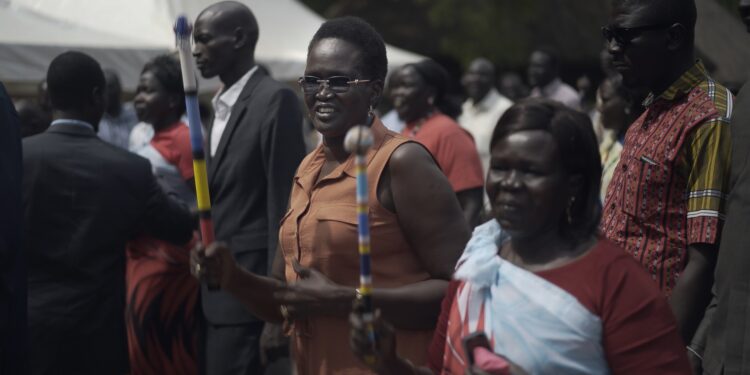I don’t know enough about South Sudan. The little I know are the stereotypes – the war, the president, the likeness of what I think its people look like. All these are products of the little screen time their lives have been shown to us as their neighbours. Neighbours so close that their flag bears so much similarity to ours, and so do their people, that we simply imagine that they are a part of us. Or maybe it’s just me. Anyway, a little South Sudanese documentary, No Simple Way Home, found its way into my field of view, and it felt big enough to immerse me into the lives of people so foreign yet so familiar to us.
Coming off their doors-open Kenyan debut held at the Alliance Française, No Simple Way Home felt confident enough to know that everyone will be curious of its premise, yet remaining silent enough to have the most curious gravitate towards it. After having a global premiere earlier in the year at the Berlin International Film Festival – the first South Sudanese film to achieve such a feat, No Simple Way Home had to wait almost a year to show itself to its own people. But it has gotten here. And every bit of it is worth the wait.
Let me start off with the filmmaking. The editors of No Simple Way Home were spot-on, everything feels divinely placed. For a story that grows through a lot of turbulences and tonal shifts, the editors were handed every right component to make the story work. The scenery is beautiful, both the mundane lives of South Sudanese people and the vast landscapes and terrain. Every scene knows when to be grand and when to be personal, when to be bold and when to be innocent, and all the little moments to glide in between.
Documentaries are hard. Most start out as someone seeking to prove something only to be trapped out the shots that eventually tell the story. No Simple Way Home feels like what happens when true filmmakers seek out genuine stories and end up finding them rather easily close to home.
For a film that spans the pre-independence, independence, and post-independence of South Sudan, the youngest country in Africa, No Simple Way Home chooses to see this history through the lens of someone who has had her whole life tied to its soil – Rebecca Nyandeng de Mabior, wife to the late John Garang, one of the founding fathers of South Sudan. The story confronts her with curiosity and familiarity, almost like a conversation we are not privy to. So we silently watch as questions are huddled and moments are shared – the questions we are too scared to ask in fear for our lives and the ones we are afraid to ask ourselves. The moments catch everyone. Whether it’s in grief, motherhood, tradition, belonging, womanhood, or the roles we choose to play in other people’s lives, No Simple Way Home gnaws at our senses of family and purpose.
Where most documentaries fail by having all the right questions set in stone, No Simple Way Home asks both the random and introspective ones inside important ones. On one side, the story shows the strength of a matriarch who has endured so much but still wakes up every single day with the willingness to be unknowingly hilarious or to join a dance when her jams drop. And on the other, her daughters in the pursuit of finding their voices and where they belong in a home they are just starting to understand.
The director, Akuol de Maribor, born and raised in exile, is one of those daughters. One of the producers, Kenya’s Sam Soko (Softie), joked that her pitch was she was going to film her mother and he didn’t know at the time who the mother was, and this film was going to be made with or without him. The mother happened to be one of the four sitting vice presidents of South Sudan, and he simply could not miss out on having cameras inside the literal inner workings of a second family. But where one expects to find the stereotypes of privilege and exuberant excesses, one finds history, tradition, grief, comedy, disaster, and genuine love.
Akuol is so convinced of the need for her mother’s story that she is not scared to tell it through her eyes, unmasking so much pain, so many sacrifices, and the courage to not run away from reality. She is not scared to show her mother on her knees and her country on her knees, correctly understanding that one does not exist without the other. Her mother is the country. Though she wanted to film her mother, No Simple Way Home becomes just as much about South Sudan. The real side is one that has been through the worst of times, times that are raw in memory and right outside their doors, but a side that is still finding a way through it all.
There were a few times I remember feeling like the film was coming to an end. Like they have said, their story is perfect. But every time, there was more, and every single addition was organic and handled with care, building on the scattered feeling every segment churned inside me. The characters enter and exit the frames so casually, and knowing it’s a documentary means those same characters are people with real lives, continuing to live out conversations and thoughts we are not privy to. The narrator, in poetic introspection, at one point in full vulnerability, digests being chased from meetings, which is what happens when children are chased away from conversations for their protection. We can only be glad to have gotten the opportunity to know a woman so casual on camera, living a truly remarkable life without fear or hate.
The story of South Sudan continues, and for every second of No Simple Way Home, I felt part of that story. And like many people said after the film, it was made to leave a connection to both the people of South Sudan, but also to ourselves, and what the hell we are doing with our lives not making a documentary of/for our mothers
When you get a chance to watch this film, carry some tissues or a comforting shoulder and prepare for some heartwarming chuckles.
Enjoyed this article?
To receive the latest updates from Sinema Focus directly to your inbox, subscribe now.











